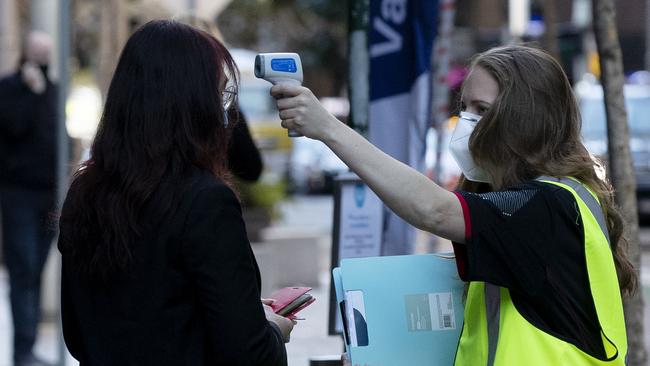Certainty needed on mandatory workplace Covid-19 jabs

The key problem is that the law on workplace safety and vaccination is vague and hard to apply. In the absence of standards set down by Parliament, the common law provides that employers can direct staff to be vaccinated where it is lawful and reasonable to do so. Unfortunately, this merely begs the question.
The Fair Work Ombudsman has released guidance hoping to fill the void. Tier one workplaces are quarantine hotels and other venues where mandatory vaccination is “more likely to be reasonable” because staff may interact with infectious people. At the other end of the spectrum, mandatory vaccination is “unlikely to be reasonable” for tier four workplaces with little or no face-to-face interaction, including because staff work from home.
The guidance is welcome, but of limited use. It is merely an attempt to interpret the vague legal standard, and in any event many workplaces lie in the large space in the middle of these tiers. As a result, the Fair Work Ombudsman has wisely advised employers to get their own legal advice because every case is fact-dependent and must be assessed on a case-by-case basis.
This leaves employers needing to make their own judgment based upon medical and legal advice. They must weigh up the circumstances of each workplace according to the legal test while taking account of the latest evidence on virus transmission and the infectiousness of each variant. Employers must also account for other laws that can affect their decision, including on privacy and anti-discrimination.
We can expect an inconsistent rollout of directives across many thousands of workplaces. Outcomes will be affected by how much risk each employer is willing to bear, both of ending up in court and of their staff and customers being infected. Employers will also need to grapple with how to accommodate conscientious objectors and people who cannot be vaccinated.
The problem for employers is further complicated because inaction on mandatory vaccination may have significant costs. Employers owe a duty of care to their staff and customers, and must provide a safe environment for both. Failing to do so can leave businesses open to claims for compensation where people are infected on their premises, especially where the risk of infection is very high and those exposed are vulnerable and likely to suffer serious harm.
Aged care facilities are a good example. It is foreseeable that unvaccinated carers will pass Covid-19 on to other carers and vulnerable elderly residents. To prevent this, aged care premises must put in place controls to prevent or minimise this risk, or face having to compensate people for the harm caused. Many other areas may also require stricter controls, including aviation, mass events such as sporting fixtures, entertainment venues and classrooms.
The Prime Minister has said that employers who do not impose mandatory vaccination will be protected from legal action by their staff. This will have the unfortunate effect of permitting employers to maintain an unsafe workplace, and an elevated risk to the community, by not imposing mandatory vaccination where they ought to do so. In any event, the indemnity will be of limited use to many employers because it will not protect against legal action by customers. This is a particular concern for workplaces that include large numbers of non-employees, such as retail outlets, universities and entertainment venues.
Employers may seek to shift the risk to their customers by asking them to sign a form waiving any claim to compensation should they be infected. It is not clear how effective this will be, or indeed generally how the courts will approach claims for compensation due to the spread of Covid in workplaces with unvaccinated staff. We only know that employers in higher risk areas face a significant and potentially very expensive legal risk whether or not they mandate vaccination for their staff.
This is an unsatisfactory state of affairs. It is a classic case of where government should intervene. Rather than leaving employers and the community bearing such high levels of risk and uncertainty, it should set down standards that improve on the current test of reasonableness. Government is well placed to do this because it can act on the latest medical advice while having regard to community expectations and values. It can develop a fair framework for employers and their staff that takes account of the need to protect the whole community from workplaces becoming sites of infection.
Workplace standards of this kind are a natural extension of the elaborate rules federal and state governments are putting out on a daily basis to manage lockdowns, border closures and other responses to Covid-19. Some governments have already set down standards in high-risk areas such as aged care and for industries like construction. We need to move beyond this piecemeal approach to nationwide standards for when employers should require their staff to be vaccinated.
George Williams is a Deputy Vice-Chancellor and Professor of Law at the University of NSW.


The pandemic has left employers and staff uncertain about what amounts to a safe workplace. Once the jab is available to everyone, do employers need to mandate vaccination in areas such as offices, hospitals, entertainment venues and classrooms? Questions like this are central to returning to more normal lives, and yet the answers are elusive. This demonstrates a pressing need for government to provide guidance and certainty.